Meal prep mastery made easy: your guide to planning a week of delicious, nutrient-packed healthy meals that will simplify your life and fuel your body. Meal prep is a game-changing approach that brings a host of benefits to the table. By dedicating a block of time, usually on weekends, to prepare meals for the upcoming week, you can eliminate the need for daily cooking sessions and reclaim valuable time for other priorities.
Meal prepping empowers you to take control of your nutritional intake, ensuring that each dish is packed with the nutrients your body needs. This consistency can be especially beneficial for those with specific dietary goals, whether it’s weight management, muscle building, or improved energy levels. With pre-portioned meals, you can better manage your calorie intake and avoid overeating, contributing to healthy eating habits.
Meal prepping also often involves buying ingredients in bulk, which can be more cost-effective than purchasing individual items for each meal. Additionally, having a plan in place helps minimize impulse purchases and reduces the frequency of eating out, leading to cost savings. Furthermore, planning meals in advance allows you to buy ingredients strategically, minimizing the likelihood of unused items going to waste, contributing to environmental sustainability and saving money on groceries.
The daily question of “What’s for dinner?” becomes a thing of the past with meal prepping, reducing stress and eliminating the last-minute scramble to put together a nutritious dinner. With pre-prepared meals, you conserve energy for other activities and can still enjoy a home-cooked, healthful dinner.
Key Takeaways
- Meal prepping saves time by eliminating the need for daily cooking sessions.
- Consistent nutrition is achieved through carefully planned, nutrient-dense meals.
- Portion control is easier with pre-portioned meals, supporting healthy eating habits.
- Bulk buying and strategic planning can lead to significant cost savings.
- Meal prepping reduces food waste by minimizing unused ingredients.
- Preparing meals in advance eliminates the stress of last-minute dinner planning.
- Meal prepping empowers you to take control of your dietary intake and achieve your health goals.
Benefits of Meal Prepping
Meal prepping offers a range of benefits that can simplify your life and support your health and wellness goals. One of the primary advantages is time efficiency. By dedicating a block of time, usually on weekends, to prepare meals for the upcoming week, you eliminate the need for daily cooking sessions, allowing you to reclaim valuable time for other priorities.
Consistent Nutrition
Meal prepping empowers you to take control of your nutritional intake, ensuring that each dish is packed with the nutrients your body needs. This consistency can be especially beneficial for those with specific dietary goals, whether it’s weight management, muscle building, or improved energy levels.
Portion Control
With pre-portioned meals, you can better manage your calorie intake and avoid overeating, contributing to healthy eating habits. This level of portion control can be a game-changer for those seeking to maintain or achieve their desired weight.
Cost Savings
Meal prepping often involves buying ingredients in bulk, which can be more cost-effective than purchasing individual items for each meal. Additionally, having a plan in place helps minimize impulse purchases and reduces the frequency of eating out, leading to further cost savings.
Reduced Food Waste
Furthermore, planning meals in advance allows you to buy ingredients strategically, minimizing the likelihood of unused items going to waste, contributing to environmental sustainability and saving money on groceries.
Stress Reduction
The daily question of “What’s for dinner?” becomes a thing of the past with meal prepping, reducing stress and eliminating the last-minute scramble to put together a nutritious dinner. With pre-prepared meals, you conserve energy for other activities and can still enjoy a home-cooked, healthful dinner.
Getting Started with Meal Prep
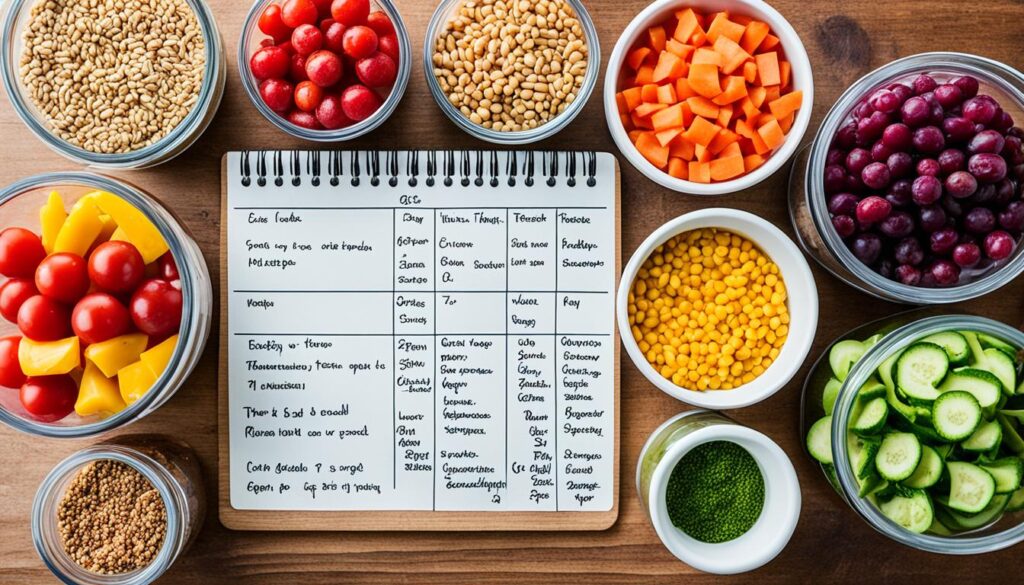
To get started with meal prepping, it’s important to set realistic goals. Consider your weekly schedule, available time, and any specific dietary needs or preferences. This will help you create a plan that is sustainable and tailored to your lifestyle.
Setting Realistic Goals
Before diving into meal prep, take a moment to reflect on what you hope to achieve. Are you looking to save time, improve your nutrition, or better manage your food budget? By defining clear and attainable goals, you can develop a meal prep strategy that aligns with your unique needs and circumstances.
Planning Your Menu
Once you’ve established your goals, it’s time to start planning your menu. Evaluate your favorite healthy meals and consider how they can be easily portioned and prepared in advance. Incorporate a variety of proteins, whole grains, fruits, and vegetables to ensure a balanced and nutrient-dense diet.
Grocery Shopping
With your menu plan in hand, it’s time to tackle the grocery shopping list. Organize your list by category to streamline the process, and be mindful of purchasing ingredients in bulk to maximize cost savings. Remember to include any necessary storage containers or meal prep tools to ensure a smooth meal prepping experience.
Healthy Meals for the Week
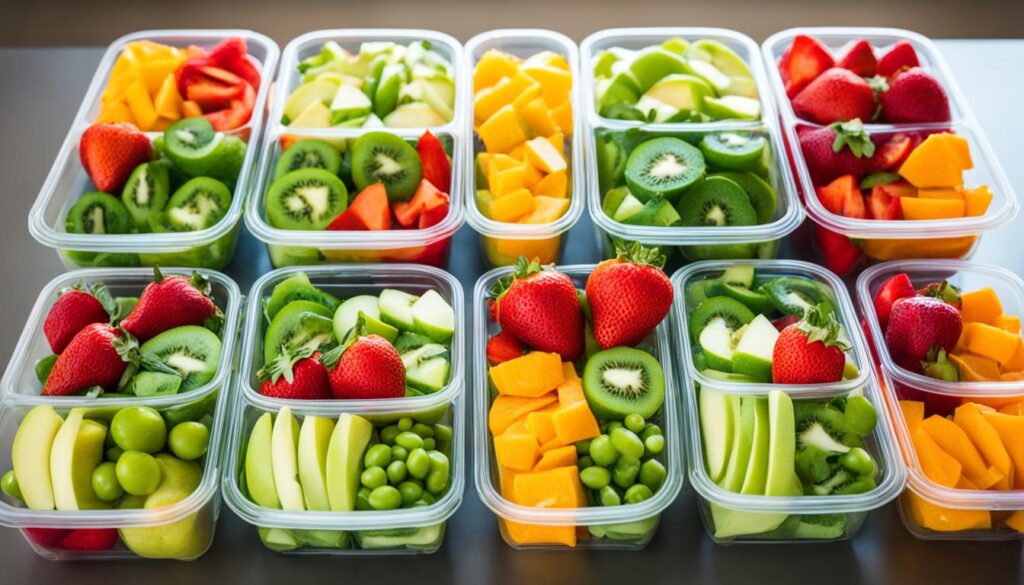
To kickstart your meal prep journey, here are three delicious and nutritious recipes to incorporate into your weekly plan:
Day 1: Quinoa Salad with Roasted Vegetables
Start your week with a flavorful and protein-packed quinoa salad featuring a medley of roasted vegetables. The earthy quinoa provides a nutrient-dense base, while the roasted bell peppers, zucchini, and onions add vibrant colors and flavors. Dress the salad with a tangy vinaigrette for a satisfying and healthy meal prep option.
Day 2: Grilled Chicken with Sweet Potato Mash
For a hearty and comforting grilled chicken dish, pair juicy chicken breasts with a creamy sweet potato mash. The natural sweetness of the sweet potatoes complements the savory grilled chicken perfectly, making this a nourishing and meal prep-friendly option.
Day 3: Lentil and Vegetable Stir-Fry
Incorporate more plant-based protein into your week with a delightful lentil and vegetable stir-fry. Sautéed lentils, broccoli, carrots, and snap peas come together in a savory and nutrient-dense dish. Serve over a bed of fluffy quinoa or brown rice for a balanced and healthy meal prep option.
Meal Prep Strategies

To make the most of your meal prep efforts, it’s helpful to employ a few key strategies. These include batch cooking, proper food storage, and leveraging convenient meal planning apps and tools.
Batch Cooking
One of the most effective meal prep strategies is batch cooking. This involves preparing larger quantities of staple ingredients or complete meals at once, making it easier to assemble nutritious dishes throughout the week. By cooking in batches, you can significantly reduce the time spent in the kitchen on busy weeknights, freeing up more time for other priorities.
Proper Food Storage
Ensuring proper food storage is crucial for maintaining the freshness and quality of your prepped meals. Invest in high-quality storage containers, such as glass or BPA-free plastic, to keep your meal prep items organized and protected. Utilize the right storage techniques, such as airtight sealing and proper temperature control, to maximize the shelf life of your prepared ingredients and meals.
Meal Planning Apps and Tools
Leverage the convenience of meal planning apps and tools to streamline your meal prep process. These digital resources can help you create customized meal plans, generate shopping lists, and even provide recipe inspiration tailored to your dietary preferences and goals. Explore popular apps like Mealime, PlateJoy, or AnyList to simplify your meal prep journey.
Healthy Snack Options
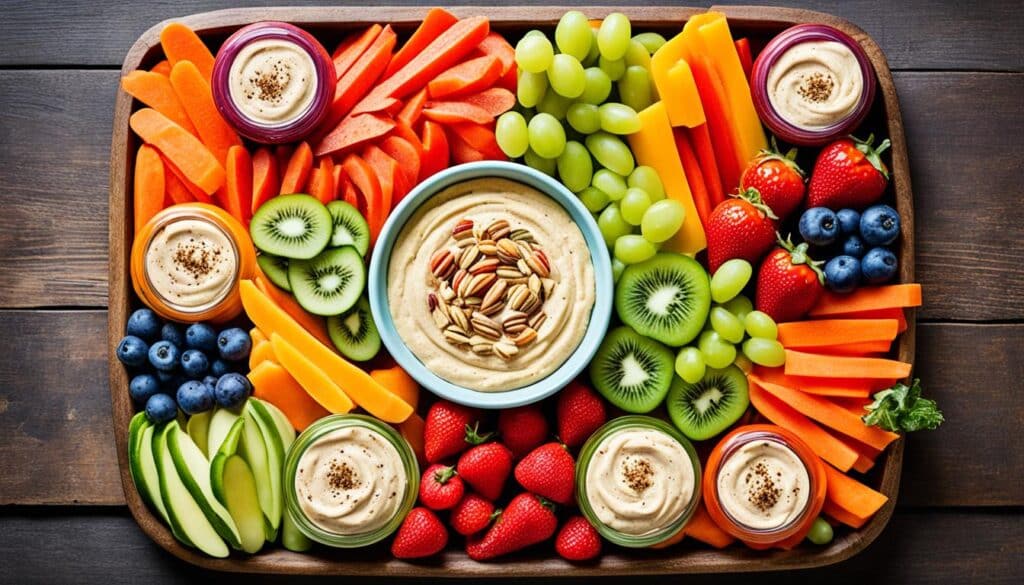
In addition to your main meals, having a selection of healthy snacks prepared in advance can be a game-changer for your meal prep routine. Some nutrient-dense, on-the-go snack ideas to consider include:
- Fresh fruit skewers with Greek yogurt dip
- Homemade trail mix with roasted nuts, seeds, and dried berries
- Veggie sticks (carrots, celery, cucumber) with hummus or guacamole
- Hard-boiled eggs seasoned with salt and pepper
- Overnight oats with chia seeds, berries, and a touch of honey
- Roasted chickpeas tossed in spices for a crunchy snack idea
By having these healthy snacks readily available, you can easily reach for a nutritious option whenever hunger strikes, helping you stay on track with your meal prep and wellness goals.
Meal Prep for Special Diets
Meal prepping can be tailored to accommodate a variety of dietary needs and preferences, ensuring everyone can enjoy the benefits of having healthy, homemade meals at the ready. Whether you follow a vegetarian, vegan, gluten-free, low-carb, or keto lifestyle, there are countless delicious and nutritious meal prep options to choose from.
Vegetarian and Vegan Options
For those following a vegetarian or vegan diet, meal prepping offers a wealth of opportunities to create satisfying and flavorful meals. Hearty vegetarian dishes like lentil stews, quinoa and roasted vegetable bowls, and tofu and veggie stir-fries can be prepared in advance, making it easy to maintain a plant-based lifestyle throughout the week. Experimenting with vegan protein sources, such as beans, tempeh, and seitan, can also add variety and nutrients to your meal prep repertoire.
Gluten-Free Meal Prep
Individuals following a gluten-free diet can also benefit greatly from meal prepping. Preparing dishes featuring gluten-free grains like quinoa, brown rice, and buckwheat can provide a solid foundation for nourishing meals. Focusing on naturally gluten-free ingredients like vegetables, fruits, legumes, and lean proteins makes it easy to assemble gluten-free meals that are both satisfying and nutritious.
Low-Carb and Keto-Friendly Meals
For those on a low-carb or keto diet, meal prepping can be a game-changer. Incorporating healthy fats, such as avocado, olive oil, and nuts, along with lean proteins and low-carb vegetables, can create keto-friendly meals that are both satiating and delicious. Dishes like zucchini noodle stir-fries, cauliflower rice bowls, and grilled salmon with roasted broccoli are just a few examples of low-carb and keto-approved meal prep options.
By embracing the versatility of meal prepping, you can cater to a wide range of dietary needs and preferences, ensuring that everyone in your household can enjoy the benefits of having healthy, homemade meals at the ready.
Healthy Meals on a Budget
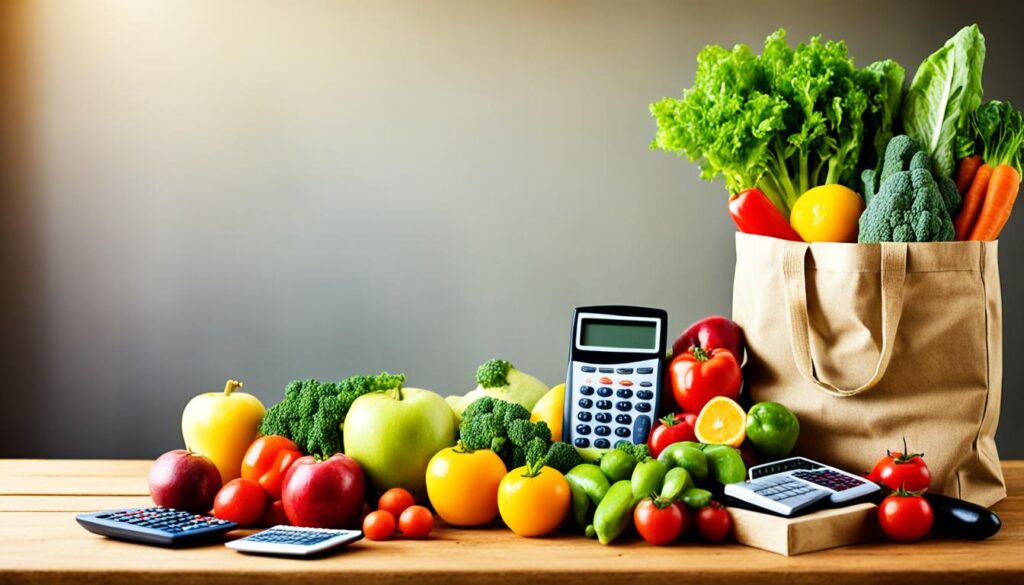
Eating healthy doesn’t have to break the bank. With a few strategic tips, you can create nutritious meals on a budget and enjoy wholesome, cost-effective dishes that nourish your body without straining your wallet.
Inexpensive Protein Sources
When it comes to inexpensive protein, look beyond the usual suspects like chicken and beef. Consider incorporating legumes, such as lentils, chickpeas, and black beans, which are not only rich in protein but also highly affordable. Eggs, canned tuna or salmon, and tofu are other budget-friendly protein options that can easily be incorporated into your meal prep routine.
Seasonal Produce
Focusing on seasonal produce is a great way to access fresh, flavorful, and cost-effective ingredients. When fruits and vegetables are in season, they are often more abundant and less expensive. Take advantage of local farmers’ markets or plan your meals around what’s currently thriving in your area to create delicious, nutrient-dense dishes without breaking the bank.
Meal Prep Bulk Shopping Tips
Embrace the power of bulk shopping to maximize your cost-effectiveness when meal prepping. Buy staple ingredients, such as whole grains, spices, and healthy fats, in larger quantities to reduce per-unit costs. This strategy not only saves you money but also ensures you have a well-stocked pantry to draw from when assembling your healthy meals.
Family-Friendly Meal Prep

Meal prepping can be a wonderful way to ensure your whole family has access to nutritious, homemade meals. To make it a truly family-friendly experience, consider involving your kids in the process and catering to picky eaters.
Involving Kids in Meal Prep
Engage your children in the meal planning and preparation process. Allowing them to help select recipes, shop for ingredients, and even assist with the cooking can foster a sense of ownership and excitement around the meals. This not only teaches valuable life skills but also encourages them to be more adventurous with healthy foods.
Meal Prep for Picky Eaters
When it comes to picky eaters, meal prepping offers an opportunity to introduce new foods gradually and in a familiar setting. Prepare a variety of kid-friendly dishes that incorporate their favorite ingredients, while also introducing new, nutritious options. This approach can help expand their palates over time without overwhelming them.
To cater to picky eaters, consider creating a meal planning template that incorporates their preferred foods, such as pasta, chicken, or vegetables, alongside new and diverse options. By offering a balanced mix, you can ensure that your family’s dietary needs are met while respecting individual preferences.
Meal Prep for Fitness Goals
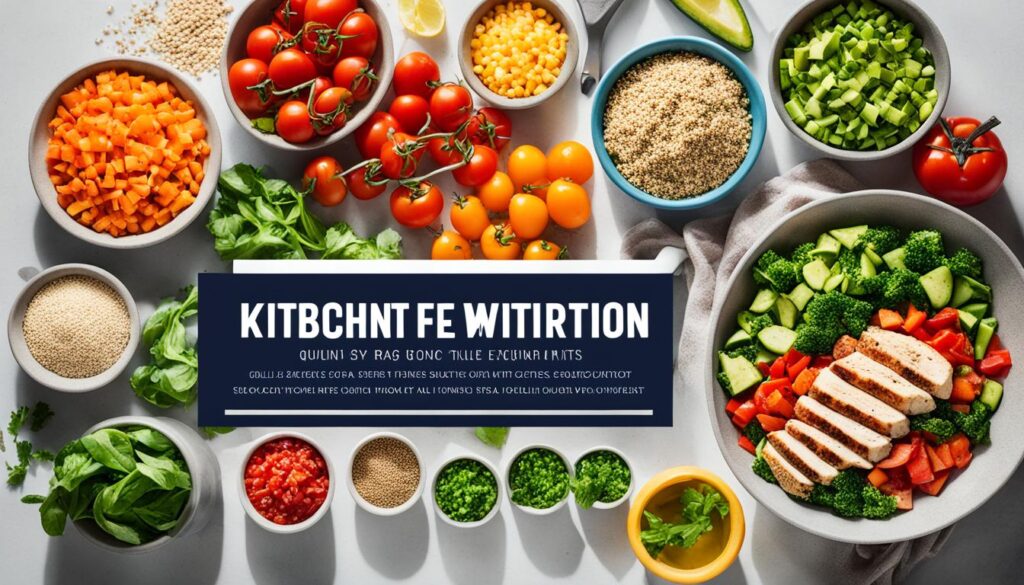
When it comes to supporting your fitness journey, meal prepping can be a powerful tool. By planning and preparing nutrient-dense meals in advance, you can ensure your body is fueled for optimal performance, both before and after your workouts.
Pre-Workout Meals
Choosing the right pre-workout meals is crucial for providing your body with the energy and nutrients it needs to power through your fitness routine. Focus on meals that are rich in complex carbohydrates, lean proteins, and healthy fats. Some great options include quinoa bowls with roasted vegetables, grilled chicken and sweet potato mash, or a lentil and veggie stir-fry. These meals will help to steadily release energy, keeping you feeling energized and focused during your workout.
Post-Workout Meals
After an intense workout, your body needs the right nutrients to recover and repair. Prioritize meals that are high in protein, with a moderate amount of complex carbs. This could include a chicken and broccoli stir-fry, a hearty vegetable-packed soup, or a turkey and avocado wrap. These meals will help replenish your muscles and support your body’s natural recovery process, setting you up for your next training session.
By thoughtfully planning and preparing your pre-workout and post-workout meals, you can optimize your nutrition to support your fitness goals, whether you’re looking to build muscle, improve endurance, or simply maintain a healthy lifestyle.
If you’re looking for healthy dinner ideas that are both delicious and healthy, easy to make, and can be prepared every day of the week, consider these best healthy dinner recipes. From healthy chicken dishes like chicken alfredo pasta and chicken lettuce wraps to chicken shawarma bowls and chicken soup, these meals are quick and easy dinner options. For a simple one pan meal, try a sheet pan dinner like chicken and asparagus or a stir fry packed with veggies. Healthy instant pot recipes and vegetarian recipes also make great additions to your dinner rotation. Enjoy a light dinner of chicken noodle soup or a hearty chicken dinner that’s ready to eat in under 30 minutes. Healthy quinoa and healthy fats provide textures and flavors that enhance any meal. With options like easy chicken dishes, one pan wonders, and simple to make recipes, you can easily get dinner ready throughout the week. These meals are perfect healthy dinner ideas that ensure you can get dinner on the table without hassle, making them great for family dinner or a quick lunch and dinner solution. Whether it’s chicken alfredo, chicken shawarma bowls, or a simple and healthy pan dinner, you’ll find these recipes incredibly easy to make and ready in 20 minutes.
Also Read: Medical Health: Trusted Advice For Optimal Wellness
Conclusion
Meal prepping is a transformative approach that can simplify your life, support your health and wellness goals, and provide you with a week’s worth of delicious, nutrient-dense meals. By dedicating a little time upfront, you can reap the benefits of increased time efficiency, consistent nutrition, portion control, cost savings, reduced food waste, and stress reduction.
Whether your aim is to follow a special diet, stay within a budget, or fuel your fitness journey, meal prep offers a versatile solution. By mastering the art of meal prepping, you’ll be on your way to a healthier, more organized lifestyle that empowers you to achieve your goals with ease.
So, take the first step towards meal prep mastery and start planning your week of nourishing, healthy meals today. Embrace the convenience, consistency, and cost-effectiveness that this transformative approach can bring to your life. Your body and mind will thank you for the investment of time and effort.
FAQ
What are the key benefits of meal prepping?
The main benefits of meal prepping include time efficiency, consistent nutrition, portion control, cost savings, reduced food waste, and stress reduction.
How do I get started with meal prepping?
To get started with meal prepping, set realistic goals based on your schedule and dietary needs, plan your weekly menu, and create a strategic grocery shopping list.
What are some healthy meal prep recipe ideas?
Some delicious and nutritious meal prep recipes to try include quinoa salad with roasted vegetables, grilled chicken with sweet potato mash, and lentil and vegetable stir-fry.
What strategies can I use to make meal prepping more efficient?
Effective meal prep strategies include batch cooking, proper food storage, and utilizing meal planning apps and tools to streamline the process.
What are some healthy snack options to have on hand for meal prep?
Nutrient-dense snack ideas for meal prep include hummus with raw vegetables, overnight oats, hard-boiled eggs, and energy bars made with whole ingredients.
How can I meal prep for special dietary needs?
Meal prepping can be tailored to accommodate a variety of dietary needs, including vegetarian, vegan, gluten-free, and low-carb/keto options.
How can I meal prep on a budget?
To meal prep on a budget, focus on inexpensive protein sources, seasonal produce, and utilize bulk shopping techniques to save money on groceries.
How can I make meal prepping a family-friendly activity?
Involve your kids in the meal prep process and cater to picky eaters to make meal prepping a collaborative and enjoyable experience for the whole family.
How can meal prepping support my fitness goals?
Meal prepping can provide you with nutrient-dense meals to fuel your workouts and aid in recovery, making it a powerful tool for supporting your fitness journey.
Source Links
- https://www.thepracticalprep.com/shop/p/mealprepmastery
- https://iquitsugar.com/blogs/articles/meal-prep-mastery-a-weeks-worth-of-healthy-lunch-recipes
- https://racheltrotta.com/healthy-eating/meal-prep-mastery/




